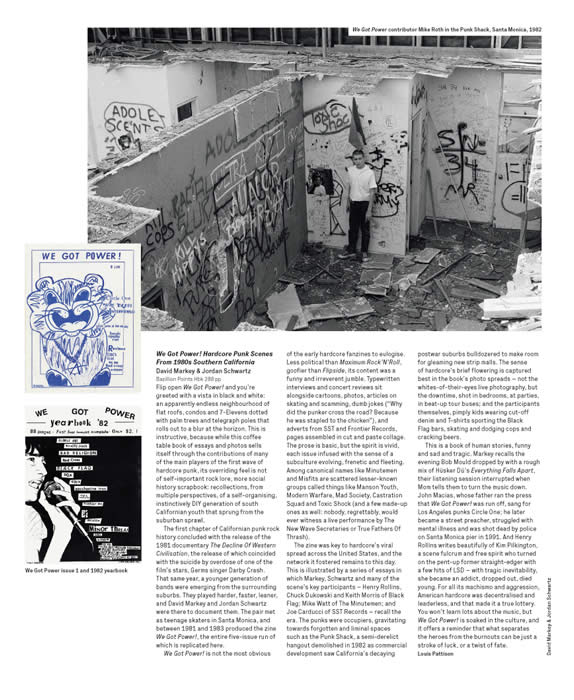

We Got Power! Hardcore Punk Scenes
From 1980s Southern California
David Markey & Jordan Schwartz
Bazillion Points Hbk 288 pp
Flip open We Got Power! and you’re
greeted with a vista in black and white:
an apparently endless neighbourhood of
flat roofs, condos and 7-Elevens dotted
with palm trees and telegraph poles that
rolls out to a blur at the horizon. This is
instructive, because while this coffee
table book of essays and photos sells
itself through the contributions of many
of the main players of the first wave of
hardcore punk, its overriding feel is not
of self-important rock lore, more social
history scrapbook: recollections, from
multiple perspectives, of a self-organising,
instinctively DIY generation of south
Californian youth that sprung from the
suburban sprawl.
The first chapter of Californian punk rock
history concluded with the release of the
1981 documentary The Decline Of Western
Civilisation, the release of which coincided
with the suicide by overdose of one of the
film’s stars, Germs singer Darby Crash.
That same year, a younger generation of
bands were emerging from the surrounding
suburbs. They played harder, faster, leaner,
and David Markey and Jordan Schwartz
were there to document them. The pair met
as teenage skaters in Santa Monica, and
between 1981 and 1983 produced the zine
We Got Power!, the entire five-issue run of
which is replicated here.
We Got Power! is not the most obvious
of the early hardcore fanzines to eulogise.
Less political than Maximum Rock’N’Roll,
goofier than Flipside, its content was a
funny and irreverent jumble. Typewritten
interviews and concert reviews sit
alongside cartoons, photos, articles on
skating and scamming, dumb jokes (“Why
did the punker cross the road? Because
he was stapled to the chicken”), and
adverts from SST and Frontier Records,
pages assembled in cut and paste collage.
The prose is basic, but the spirit is vivid,
each issue infused with the sense of a
subculture evolving, frenetic and fleeting.
Among canonical names like Minutemen
and Misfits are scattered lesser-known
groups called things like Manson Youth,
Modern Warfare, Mad Society, Castration
Squad and Toxic Shock (and a few made-up
ones as well: nobody, regrettably, would
ever witness a live performance by The
New Wave Secretaries or True Fathers Of
Thrash).
The zine was key to hardcore’s viral
spread across the United States, and the
network it fostered remains to this day.
This is illustrated by a series of essays in
which Markey, Schwartz and many of the
scene’s key participants – Henry Rollins,
Chuck Dukowski and Keith Morris of Black
Flag; Mike Watt of The Minutemen; and
Joe Carducci of SST Records – recall the
era. The punks were occupiers, gravitating
towards forgotten and liminal spaces
such as the Punk Shack, a semi-derelict
hangout demolished in 1982 as commercial
development saw California’s decaying
postwar suburbs bulldozered to make room
for gleaming new strip malls. The sense
of hardcore’s brief flowering is captured
best in the book’s photo spreads – not the
whites-of-their-eyes live photography, but
the downtime, shot in bedrooms, at parties,
in beat-up tour buses; and the participants
themselves, pimply kids wearing cut-off
denim and T-shirts sporting the Black
Flag bars, skating and dodging cops and
cracking beers.
This is a book of human stories, funny
and sad and tragic. Markey recalls the
evening Bob Mould dropped by with a rough
mix of Hüsker Dü’s Everything Falls Apart,
their listening session interrupted when
Mom tells them to turn the music down.
John Macias, whose father ran the press
that We Got Power! was run off, sang for
Los Angeles punks Circle One; he later
became a street preacher, struggled with
mental illness and was shot dead by police
on Santa Monica pier in 1991. And Henry
Rollins writes beautifully of Kim Pilkington,
a scene fulcrum and free spirit who turned
on the pent-up former straight-edger with
a few hits of LSD – with tragic inevitability,
she became an addict, dropped out, died
young. For all its machismo and aggression,
American hardcore was decentralised and
leaderless, and that made it a true lottery.
You won’t learn lots about the music, but
We Got Power! is soaked in the culture, and
it offers a reminder that what separates
the heroes from the burnouts can be just a
stroke of luck, or a twist of fate.
Louis Pattison